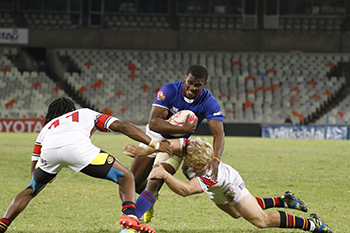Latest News Archive
Please select Category, Year, and then Month to display items
06 April 2018
Photo Rulanzen Martin
 From the left: Dr Thulisile Mphambukeli, leader of the BRICS research team that is exploring the political economy of water and food security, and her research partner, Dr Victor Okorie.
From the left: Dr Thulisile Mphambukeli, leader of the BRICS research team that is exploring the political economy of water and food security, and her research partner, Dr Victor Okorie.
A Brazil, Russia, India, China and South Africa (BRICS) delegation is to hold the 10th Annual BRICS Summit in the last week of May 2018 in Johannesburg. Dr Thulisile Mphambukeli, leader of the University of the Free State (UFS) research team alongside Dr Victor Okorie from the Department of Urban and Regional Planning, in collaboration with Prof Lere Amusan of North-West University, will ensure that water and food security is a prominent feature on the gathering’s agenda.
First, the project titled: “Exploring the political economy of water and food security nexus in BRICS and Africa” will debut at the National Institute for the Humanities and Social Sciences BRICS Think Tank Forum”.
According to Dr Mphambukeli, the key to water security is attitudinal change by means of education and conscientisation. This, she is adamant about, holds the potential to drive behavioural adjustments in the way society interacts with water.
Genetic and social approaches
Dr Okorie asserts that if strides towards reducing the demand for water were to be made, research efforts should be geared towards effecting changes at DNA level. Meaning we need to explore waterwise ways that enable crops and animals to thrive optimally.
The project also looks at social dimensions of water such as flushing a toilet. “Research activities on redesigning toilets, especially the urinal, where more than nine litres of water are used to flush less than one cubic centimetre of urine, are timely in the context of managing water and the food nexus crises,” said Dr Okorie.
Combining the genetic and social approaches would allow us to produce more with a smaller water footprint. This can be made possible by implementing precision agriculture which is about estimating and applying exact quantities of water and nutrients needed for the production of crops or the raising of livestock.
Paradigm shifting policies
Prof Amusan said the team intended to propose functional solutions that take the quality of water into consideration. Equitable production and distribution of water depends on endorsing policies of co-production between citizens, governments and the public sector. BRICS member states mutually consider water and food security as an issue of paramount significance, hence its feature on this prestigious summit’s agenda.
Young Shimla team reach Varsity Cup semi-final
2017-03-29

The Shimlas will be hoping that some of their stars,
like the brilliant flanker Phumzile Maqondwana, will be
on form in the 2017 Varsity Cup semi-final against
Tuks in Pretoria.
Photo: Johan Roux
The pressure in the Varsity Cup semi-final is on Tuks, which will be reason enough for Shimlas to play with freedom.
This is according to Jaco Swanepoel, Shimla assistant coach, on the big challenge awaiting his young rugby team in Pretoria on 3 April 2017. He says because Tuks are the favourites, it could be to the advantage of the visitors. Maties and the University of Johannesburg are playing in the other semi-final in Stellenbosch on the same day.
Tuks did Shimlas a favour
Tuks’ victory of 43-28 over the Pukke in Potchefstroom on 27 March 2017 helped the Shimlas, who had a bye, to end fourth on the log with 23 league points.
Shimlas had to make use of several new players this year, and few experts would have given them a chance of reaching the semi-finals. Swanepoel says although they are proud of this achievement, only a place among the top four was never their end-goal.
Good to be the underdog
The Shimlas lost their league match against Tuks in Bloemfontein with 19-65. This, as well as the fact that Tuks was at the top of the log with 34 league points, underlines the huge task ahead.
“The previous result (against Tuks) is encouragement for the players to show: We aren’t that much worse than Tuks,” says Swanepoel. “Perhaps it is good to be the underdog. We actually have no pressure on us and I hope the players feel the same way.”
Three teams in knockout matches
All three Varsity Cup teams from the University of the Free State (UFS) reached the knockout matches. Apart from Shimlas, the UFS Young Guns played against Tuks in a semi-final in Bloemfontein on 27 March 2017, but lost by 21-45. On 17 April 2017, Vishuis will meet the Puk’s Patria in the residence finals.